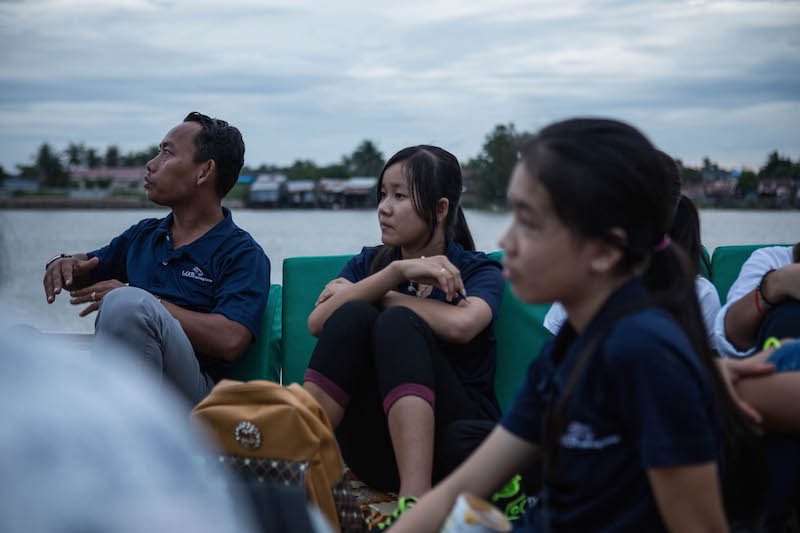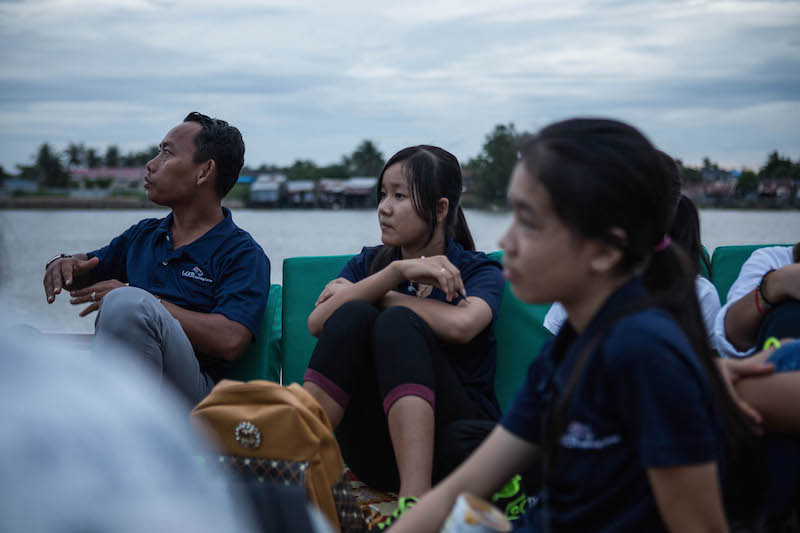KAMPOT CITY – Reading for pleasure is a new notion to me.
Growing up in a small town along National Road 4 about 20 minutes from Sihanoukville, textbooks were the only reading materials in my childhood home and classrooms. I was a dutiful student, but there were no school or community libraries, and reading for fun was never encouraged, or even suggested.

When I started university in 2009, I began to expand my literary boundaries, but I still didn’t venture beyond reading textbooks, news and other online content—often links that piqued my interest as I scrolled through my Facebook feed.
Now a 24-year-old reporter for The Cambodia Daily, I have never finished a book that was not assigned, or even read more than 30 pages of one.
I’m not unique. Leisure reading is not something students “have the luxury” of being exposed to in Cambodia, said Carolyn Coxhead, a trustee for the literary NGO Books for Cambodia.
“Even people we know, Cambodian people we know who have a good education…who are inspirational teachers—you don’t see them reading for pleasure,” Ms. Coxhead said.
And so I arrived at the second annual Kampot Writers and Readers Festival this weekend, where this lack of appreciation for literature was illustrated by the imbalance between the number of Cambodian and foreign participants and attendees.
From workshops to author talks and panels, Khmer translation was not offered—but it was largely unnecessary. The crowds were composed predominantly of foreigners, and the Cambodians I crossed paths with were most often part of the weekend’s lineup.
Thavry Thon, 27, an avid reader and author of children’s books and inspirational stories, was among those tapped for a “New Cambodian Voices” panel, which featured a handful of local authors. Her latest book, a memoir entitled “A Proper Woman,” depicts her struggle to defy tradition in pursuit of her dreams.
“I write with the hope of inspiring young women to live out their dreams through my experiences when they read,” Ms. Thon said.
She plans to have the memoir, which is to be published in January, translated into Khmer “to make sure that the book will be in women’s hands in rural areas and just be a piece of inspiration.”
But as the authors discussed the challenges of engaging an audience, a fundamental issue emerged.
“I feel a little regret, because not many Cambodian people have come” to the festival, said Yeang Chheangly, 29, an author and co-founder of the Magic Library, an organization that delivers books to rural villages around the country.
“How can our writers make an impact on the next generation of Cambodia, especially in a country where people do not like to read?” asked Kim Dyna, 25, an audience member and journalist at Hang Meas TV.
As the question bounced around the room, the consensus was that a passion to write would propel young authors. But the issue stretches further than a mere disinterest in literature. According to Unesco, about 2.1 million adults in Cambodia were unable to read or write as of last year.
One of the goals of the Kampot festival is to “put a spotlight” on this, according to Julien Poulson, a founding organizer of the festival.
“I think it gives the opportunity for organizers and teachers and writers and readers to get together and look at that for themselves,” he said, adding that writers groups and other creative programs had been created after the inaugural festival last year.
The festival’s unique take on storytelling—which includes music, spoken word, film and art—is meant to overcome illiteracy and language barriers and “create a structure to empower our Khmer audience,” Mr. Poulson said. “Our simple aim is to promote literacy to share stories. We’ve all got stories.”
Yet the lack of encouragement for Cambodians to read, as well as the dearth of available books, is disheartening for readers and would-be readers alike.
After attending the festival and hearing the stories of creative fellow Cambodian and foreigners, it’s clear that literature can stoke ideas and development. But unless we are taught to appreciate them, authors may give up, and the country will continue to lack captivating books.
While a focus on literature across the country will not develop overnight, the Kampot Festival could have a niche part in shifting Cambodia’s reading culture.
Already, it has inspired in me a new appreciation for leisure reading. Leaving the relaxed environs of Kampot and returning to fast-paced Phnom Penh, I plan to read past page 31.
(Additional reporting by Janelle Retka)




